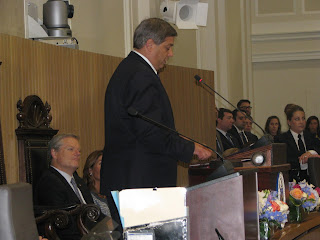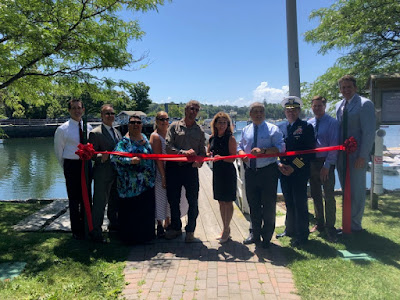The State Senate is expected to act on a bill this week, An Act Promoting Climate Change Adaptation, Environmental And Natural Resource Protection, And Investment In Recreational Assets And Opportunity, which will authorize more than $2 Billion to provide for a program of climate change adaptation and the preservation and improvement of the environmental and energy assets of the Commonwealth.
In addition to the 61 page bill there are a total of 289 amendments – you can read the bill and the text of the amendments by clicking this link:
Senate Bill 2591.
Bond bills can include authorizations to fund particular programs as well as changes to the General Laws and public policy. These authorizations empower, but do not compel, the Governor to borrow funds for their completion or execution.
This law would impact many state executive offices and departments including: the Executive Office Of Energy And Environmental Affairs, the Executive Office Of Public Safety And Security, the Department of Agricultural Resources, the Department of Conservation and Recreation, the Department of Environmental Protection and many others.
The bill purports to strengthen our air quality protection measures, our clean water and drinking water programs, and help in the rehabilitation, repair or removal of coastal infrastructure such as, seawalls, jetties, and help with beach nourishment, and support for municipal programs across the state.
Here is a thorough summary of the bill:
o $2 million for replacing and modernizing underground petroleum storage tank equipment;
o $10.5 million for improvements and replacements to assets and infrastructure for the Executive Office of Energy and Environmental Affairs;
o $165 million for a community investment grant program;
o $60 million for coastal infrastructure and resiliency measures;
o $75 million for publicly owned dams and seawall projects;
o $32 million for the capitalization of the Transfer of Development Rights Revolving fund;
o $95 million for investment in water and air quality protection;
o $7.5 million for management of solid waste facilities;
o $40 million for hazardous materials cleanup and response;
o $30 million for the acquisition of land by the Department of Fish and Game;
o $50 million for improvements and replacements to assets and infrastructure for the Department of Fish and Game;
o $55 million for river and wetland restoration programs;
o $50 million for programs to address agricultural economic and environmental sustainability;
o $20 million for a program to acquire agricultural preservation restrictions;
o $75.5 million for natural resource restoration and protection for costs associated with hazardous materials response actions;
o $40 million for the acquisition of land by the Department of Conservation and Recreation;
o $20 million for natural resource protection;
o $21 million for improvements to coastal and inland waterways by the Department of Conservation and Recreation;
o $105 million for improvement to state-owned dams and flood-control projects;
o $10 million for aquatic invasive species protection;
o $420 million for Department of Conservation and Recreation maintenance and recreational facilities;
o $160 million for Department of Conservation and Recreation roads, trails and bridges;
o $100 million for the implementation of the integrated state hazard mitigation and climate change adaptation plan;
o $75 million for the municipal vulnerability preparedness program;
o $5 million to fund the Global Warming Solutions Trust Fund;
o $10 million for climate change science and data program;
o $9 million for the Massachusetts Electric Vehicle Incentive Program;
o $6 million for climate-oriented emergency response programs;
o $60 million for the Clean Water Trust Fund;
o $10 million for tree planting programs on public land;
o $30 million for a program to allow the Executive Office of Energy and Environmental Affairs to protect Article 97 lands;
o $60 million for an urban and suburban parks program;
o $25 million for investment in trails;
o $25 million for a forestry and tree planting program;
o $55 million for the Complete Streets municipal program;
o $178.5 million for the state’s share of federal aid eligible transportation projects.
• Creates the Global Warming Solutions Trust Fund to be used to fund costs associated with implementation of the Global Warming Solutions Act, the Commonwealth’s Clean Energy and Climate Plan, and state and local strategies for climate change adaptation.
• Creates the Agricultural Innovation Fund to finance grants for the Commonwealth’s agricultural and cranberry producers for innovative ideas and approaches that add value to the economy.
• Updates many fine and penalty schedules for marine fisheries violations.
• Requires the Executive Office of Energy and Environmental Affairs and the Executive Office of Public Safety and Security to: (i) coordinate to strengthen resilience and prepare for the impacts of climate change; (ii) publish, every five years, an integrated state climate adaptation and hazard mitigation plan; (iii) establish frameworks for state agency and municipal vulnerability assessments that will be incorporated into the state plan; and (iv) implement the state plan and incorporate information learned from implementing the state plan in plan updates.
• Authorizes an alternative valuation of qualifying agricultural, forest or recreational land left in a person’s estate, at the election of the estate, provided that the land remains in such use for at least 10 years.
• Authorizes entities with jurisdiction over a roadway to permit recreational vehicle travel, with local police chief approval, on certain public ways for increased connectivity to authorized trails and essential services.
• Requires animal inspectors, within 90 days of appointment and every two years thereafter, to complete all state-funded training.
• Prohibits a municipality from charging a Massachusetts veteran a shellfish permit fee higher than the fee charged to a resident of that municipality.
• Authorizes the Department of Conservation and Recreation to discount or waive charges or fees for DCR parking passes for veterans.
• Directs state agencies expending authorized bond funds to minimize the use of funds to pay for services rendered by agency employees or by consultants.
• Requires any state entities expending or receiving bond funds to acquire a fee interest in land to obtain the approval of the Secretary of Energy and Environmental Affairs before prohibiting fishing, hunting or trapping on the land.
• Authorizes state agencies acquiring land or an interest in land pursuant to this act to expend no more than 5 per cent of the amount appropriated to reimburse nonprofit land conservation organizations or land trusts for expenses directly associated with such acquisition.
• Requires an annual report by the Executive Office of Energy and Environmental Affairs detailing the progress of projects funded through this act.
• Requires the Director of the Division of Marine Fisheries to conduct a study of the current lobster fishery and provide a recommendation as to the advisability of enacting statutory or regulatory changes to allow the processing of lobster parts in Massachusetts.




















































